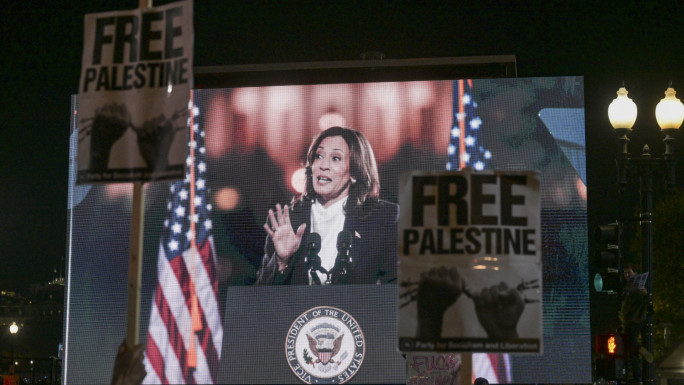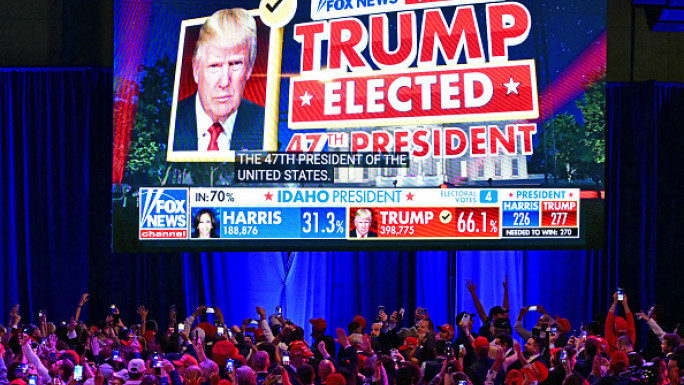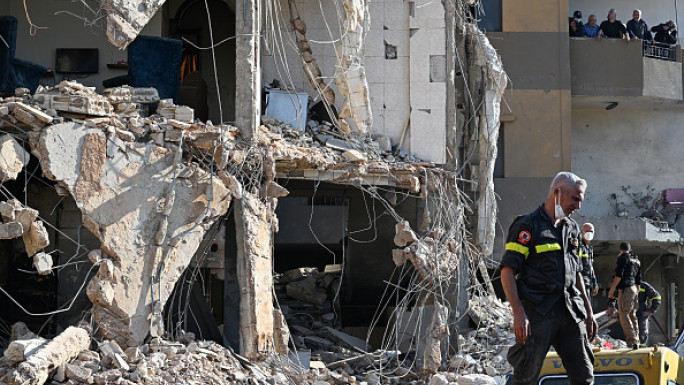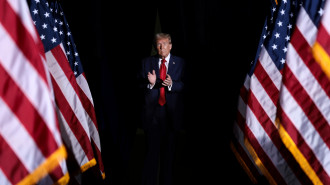
How the Ukraine war impacted Russia's standing with Arab autocrats

America’s Arab allies and partners have lost much faith in Washington’s ability to guarantee their security.
The policies of President Joe Biden and his predecessors have contributed to officials in many Arab states believing that they should diversify their global relationships to become more autonomous from the US.
A growing perception among authoritarian Arab leaders is that the West is unreliable, illustrated by Saudi Arabia’s conclusion that the Obama administration discarded Hosni Mubarak like a “used Kleenex”.
Russia has greatly exploited this growing distrust in Washington on the part of capitals in the Arab region.
"America's Arab allies and partners have lost much faith in Washington's ability to guarantee their security"
Moscow has tried to bolster a narrative about Russia, unlike Western powers, standing by its friends in the Middle East, particularly since its military intervention in Syria intensified in 2015.
With President Vladimir Putin at the helm, Russia has sought to present itself as a pillar of a new anti-hegemonic axis forming alongside China in a new multipolar world.
Russian officials responsible for Moscow’s Middle East foreign policy have depicted Saudi Arabia and the UAE as part of this new axis.
In 2019, Foreign Minister Sergey Lavrov promoted Moscow’s plans for collective security in the Gulf and worked to sell it to the Emiratis, Omanis, and others in the Gulf Cooperation Council (GCC) who took an interest in it.
When Moscow’s top diplomat was in Bahrain on 31 May, he continued promoting Russia’s vision for Gulf security, blasting the Americans’ desire to “conduct business…on the basis of dictate and the conviction that they have a destination to rule the whole world”, while also calling for a greater security balance in the Gulf that is amenable to the interests of both Iran and GCC members.
But mindful of the Russian military’s performance in Ukraine this year, some Arab states have increasingly doubted Moscow’s ability to one day guarantee their defence.
As countries such as Egypt, Saudi Arabia, and the United Arab Emirates (UAE) face dire security dilemmas, it is difficult for them to imagine Russia, which failed to decisively achieve a military victory over one of its much smaller neighbours, replacing the US as their number one security partner in the world.
Regarding Moscow’s foreign policy agenda in the Middle East, “the illusions and the bluster coming from Moscow are not really matched by the responses of regional actors,” Samuel Ramani, an associate fellow at the Royal United Services Institute, told The New Arab.
“What I’m seeing is not much progress at all, for example, in the movement for Russia’s collective security plan for the Persian Gulf,” added Ramani.
“So even as Saudi Arabia and Iran are trying to, in some ways, work out their differences in the event of a JCPOA agreement, or as the Emiratis are concerned about the drone strikes from Yemen and other issues, they’re not really turning to Russia and its security plan as a viable counterweight.”
|
|
Since the Russian-Ukrainian war erupted, which caused Russia to immediately become the world’s most sanctioned country, Arab countries have not been calling Moscow for new weapons deals.
Concerns about secondary sanctions are probably a major factor. But so is growing doubt about the quality of Russian military equipment considering everything that they’ve observed in Ukraine post-24 February.
“[Moscow’s] success in Syria enabled Middle Eastern countries to either flirt with, or outright try to purchase Russian military equipment. Now you’re not seeing that much of that,” explained Ramani.
“You’re not seeing Egypt going beyond the SU-35s. Saudi Arabia had Russian equipment at the Riyadh Defense Expo but nothing more. The Emiratis are not really moving to replace some of their Pantsir S-1s [a Russian-designed self-propelled anti-aircraft gun and missile (SPAAGM) system] that they were using in Libya on Haftar’s behalf. So Russian arms exports have also stopped. That’s an area where Russia has a problem.”
"Autocrats never forget that Putin's Russia has always used military violence and imperialist instincts in ways profoundly compatible with authoritarianism"
Nonetheless, Moscow wants to capitalise on the fact that beyond the 2 March vote at the UN General Assembly - in which all Arab states (save Algeria and Syria) voted in favour of the resolution slamming the Russian invasion - there has been very little condemnation of Russian aggression in Ukraine from Arab governments, which are also not sanctioning Russia in lockstep with the Western partners.
“Aspects of the international situation, which are connected with the events unfolded by the West around Ukraine, are well understood by our partners from the [GCC] states,” said Lavrov at his 1 June press conference in Riyadh, where he addressed high-ranking Gulf Arab diplomats.
“We appreciate and reaffirmed today once again [that we are grateful for] the balanced position that they take towards this issue at international forums, and in practice, refusing to join the illegitimate, unilateral Western sanctions that were introduced against Russia.”
Put simply, Arab states and many countries from Africa to Latin America are not willing to burn bridges with Moscow.
This stems from the desire of many in the ‘Global South’ to make the international geopolitical order less US-dominated. The reason why is simple.
“The United States and its Western allies happen to be deeply unpopular in the Middle East and Africa,” Jalel Harchaoui, a researcher specialising in Libya, said in an interview with TNA.
The fallout from the 2003 Iraq war and the instability that resulted from the 2011 Arab Spring uprisings informed a narrative among Arab statesmen that liberal democratic idealism, which inspired disastrous military interventions against Arab countries between 2003 and 2011, leaves their regimes unsafe.
“The rulers still in place today in the region deeply resent that behaviour and the ideology that elicited [the West’s military intervention against Saddam Hussein and Muammar Gaddafi],” said Harchaoui.
“In contrast, autocrats never forget that Putin’s Russia has always used military violence and imperialist instincts in ways profoundly compatible with authoritarianism. The textbook case is the fact that Moscow didn’t hesitate to kill thousands of Arab fighters and civilians alike for the sake of maintaining Syria’s Assad in power.”
"Looking ahead, Arab governments and others in the Global South are likely to see security and economic cooperation with China, not Russia, as the path toward a less Western-centric order"
Russia’s counterrevolutionary agenda in the Arab region, most vividly illustrated by its defence of Syria’s government and ideational synergies with Abu Dhabi, helps explain why Arab regimes still want to maintain their partnerships with Russia while lacking any inclination to condemn Moscow’s aggression against Ukraine.
This is not to say that they support Russia’s rogue behaviour in Ukraine, but they don’t see condemning it as beneficial to their countries.
“After all, Saudi Arabia and the Emirates believe they should have the right to attack Yemen without being criticised. Those same two powers seriously considered invading Qatar in June 2017, too,” Harchaoui told TNA.
“At the same time, there is also the opinion of the public across the Middle East and Africa, whose majority has no desire to demonise Russia.”
Ultimately, in Riyadh and Abu Dhabi there are major frustrations with the Biden administration’s approach to the Middle East. This has much to do with issues including the White House’s decision to delist the Houthis as a “foreign terrorist organisation” and how team Biden is going about trying to revive the Joint Comprehensive Plan of Action.
But when it comes to their views of what Russia can do to usher in a new multipolar order, the Ukrainian conflict has strongly suggested that this vision of Moscow as an order builder was based more on abstractions rather than anything substantive or tangible.
Looking ahead, Arab governments and others in the Global South are likely to see security and economic cooperation with China, not Russia, as the path toward a less Western-centric order.
In this sense, it is China - not the West - that can be expected to gain clout in the Arab world because of Putin’s ‘special military operation’ in Ukraine.
Giorgio Cafiero is the CEO of Gulf State Analytics.
Follow him on Twitter: @GiorgioCafiero





 Follow the Middle East's top stories in English at The New Arab on Google News
Follow the Middle East's top stories in English at The New Arab on Google News


